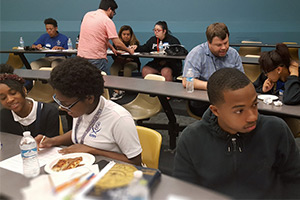
CHAMP Recognized with Two National Awards

Volunteer-Led Efforts Provide Students with Tools for Success
In 2013, Mark Tomforde, associate professor of mathematics, started a volunteer-led math program, called Cougars and Houston Area Math Program, or CHAMP for short, based on a simple premise. If you equip students with problem-solving tools for math, this will set them up for success in education, as well as daily life.
In honor of its successes, CHAMP was recognized with two national awards: The American Mathematical Society (AMS) ‘Mathematics Programs That Make a Difference Award,’ and a Phi Beta Kappa Arts and Sciences Award.
AMS and Phi Beta Kappa Recognition
The ‘Make a Difference Award,’ which came with a $1,000 honorarium, recognizes programs that have demonstrated success in bringing people from underrepresented backgrounds into math, and can be replicated at other institutions.
The Phi Beta Kappa Award acknowledged Houston as an Arts and Sciences City of Distinction, with four Houston-area organizations recognized for their “innovative efforts to engage broad and diverse audiences with the arts, humanities, social sciences, natural sciences, or mathematics.” CHAMP received a $5,000 cash prize.
Volunteer-Led Organization
With a mission of addressing underrepresentation in math and science and creating pathways for careers in STEM fields, CHAMP is made up of undergraduate students who volunteer their time as tutors for local high-need schools.
 “The students that choose to volunteer their time are committed to being there,” Tomforde said.
“The students that choose to volunteer their time are committed to being there,” Tomforde said.
Currently, CHAMP provides weekly tutoring at two middle schools and one high school: Baylor College of Medicine Academy at Ryan Middle School, KIPP Liberation College Preparatory and KIPP Sunnyside High School. In addition to tutoring, CHAMP also organizes a Math Day each semester, where students come to UH for a day of math-related activities.
“Many of these students, in spite of living in neighborhoods near UH, have never set foot on a college campus,” Tomforde said.
Making a Difference in Lives of Students and Volunteers
Five years after being formed, CHAMP has made a difference in the lives of students and volunteers alike. Many of the volunteers have been inspired to pursue graduate school and/or teaching, while students who received tutoring have reported an overall improved mindset about their ability to solve problems.
Given that this program runs on a shoestring budget, provided by small grants and donations, this is a model that can replicated at other universities.
Math Circles: Math as a Creative Pursuit
CHAMP is modeled after a type of extracurricular activity, called math circles, in which university professors go into local middle schools and high schools, to get students thinking about math in nontraditional ways.
“The math that students see in school is very procedure-based, which means they get a false impression of what mathematics is,” Tomforde said. “We want to emphasize the creative aspect, that it’s about critical thinking, finding multiple ways to solve problems, and looking at problems with different perspectives.”
Rachel Fairbank, College of Natural Sciences and Mathematics